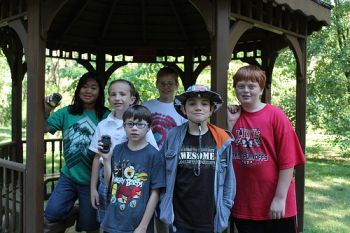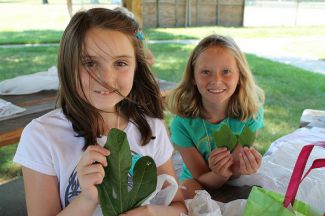
Some campers in the beginner equestrian group rode a horse for the very first time during Camp at The Woods.
Even with a record-breaking summer heat wave, the treetops blanketing Saint Mary-of-the-Woods College made a cool canopy for 40 children in the “Camp at The Woods” summer day camps. In fact, even with the heat, Maddie Davis, 8, wouldn’t have had it any other way.
“I really love nature and being outdoors,” Davis said, organizing her leaves in SMWC’s shaded outdoor classroom. “I like the trees a lot.”
Like little Lewis and Clarks, children ages 6-14 traversed the campus from June 25-27, 2012, in one of three new day camps offered at The Woods – robotics, equestrian and nature. Campers in each group enjoyed lunch as well as before- and after-care. Inside the classrooms, campers used college technology and equipment for experiments and interactive projects. Outside, the children explored SMWC’s beautiful wooded campus.
“The kids in the community get to know us and we get to know them,” said Vicki Kosowsky, vice president for student life at SMWC. “They have fun and learn something in the process.”

Geocaching during the robotics camp allowed the group to discover SMWC’s diverse outdoor environment.
Emerging from the trees, a small team of explorers followed the beep of a GPS toward buried treasure, also known as a geocache. Geocaching uses satellites and GPS devices to find hidden containers scattered all over the world. During the week, the robotics campers hunted for geocaches, launched Alka-Seltzer rockets, and designed and programmed robots.
“We worked with math, engineering, physics, chemistry and technology,” said robotics camp counselor Mary Samm, technical support specialist at SMWC. “While these STEM topics are very important, the other life skills we incorporated are priceless. The students learned to work in groups, solve problems, be creative, analyze their work and to follow instructions.”
Kicking up dust in SMWC’s outdoor arena, the equestrian campers – beginner and advanced – explored a different natural element at The Woods. “Riding was a teensy bit scary at first,” said Fia Skillman, 11, in the beginner equestrian camp. “But the horses are really gentle and nice. It was a lot of fun.”
Working with College-owned horses, the beginner campers learned the basics of riding and caring for horses. “They learned how much work and responsibility horses are,” said Sara Schulz, assistant operations manager of the stables at SMWC. “While riding, the campers really began to blossom. “Their smiles and giggles speak for themselves.”
Mimicking a timeless childhood game, advanced equestrian campers played “Simon Says” in the saddle, learning how to control their horses’ every move. They came with an established riding foundation and rode their own horses, practicing traditional techniques and learning new styles. “Animals are great teachers,” Schulz said, “we just need to learn to listen to and understand their language.”

Campers in the nature group collected interesting leaves that they later used as stamps to paint t-shirts.
Hiking past the stables, nature campers probed The Woods, examining the flora and fauna. These mini-environmentalists got both creative and scientific –they painted t-shirts with leaves and then analyzed the pH balance of liquids with cabbages. “I hope the children learned not only to appreciate and observe nature, but also to ask questions about the world around them,” said SMWC adjunct professor and nature camp counselor Mary Beth Eberwein. “Appreciating nature is vital for the survival of our natural world and asking questions will help them to become better scientists in the future.”
Higher education isn’t just about majors and degrees; it’s about the value of lifelong learning. SMWC’s community events, such as these summer camps, share the College’s innovative mission with the Wabash Valley. Early exposure, especially on a college campus, reinforces the idea that college isn’t an “if,” it’s a “when.”
“We had students from different schools in the Wabash Valley and they all came together and found similar likes and agreed on common goals,” Samm said. “The children attending camp now have new ambitions and new opportunities to pursue different avenues of education.”
